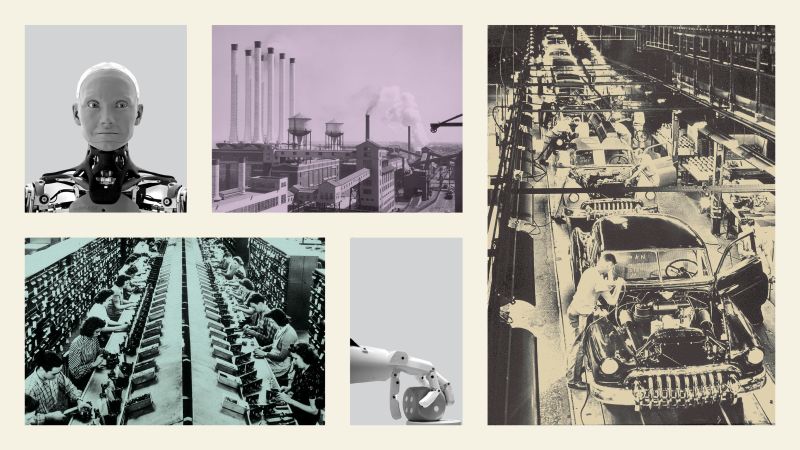Washington
CNN
—
President Donald Trump is overhauling the wrong economic policies, industry experts say, and it could cost America the high-stakes artificial intelligence race against China.
Trump last week announced sweeping tariffs to reinvigorate US manufacturing, an industry that’s been in decline for decades. But the tariffs — along with gutting funding for universities and calls to dismantle the CHIPS Act — could sabotage America’s momentum in the AI race.
While the Trump administration says it recognizes the importance of remaining a global leader in AI — even announcing hundreds of billions in investments for the development of AI infrastructure — some of the administration’s actions are counterproductive.
Stiff tariffs won’t usher in the economic success Trump is seeking, according to most economists. Meanwhile, the competition in the AI race has only been heating up, as Chinese startup DeepSeek unveiled a powerful model in January.
“Trump and his advisers see the world in a 19th century perspective, wanting to return to a manufacturing economy,” Susan Ariel Aaronson, research professor of international affairs at George Washington University, told CNN. “AI now underpins a lot of other technologies that could be even more important, and the United States really needs to invest in that.”
Employment in the US manufacturing industry began to decline after reaching a peak in the late 1970s, according to Labor Department data, shrinking by an even faster pace around the turn of the century.
Researchers say it wasn’t just globalization and free trade that slowed down US manufacturing over the past few decades, but also increased automation and stiff global competition. Meanwhile, the US services industry — from finance to software engineering — blossomed: About four in five US jobs are in the services sector, according to Labor Department data.
According to the World Economic Forum, the jobs of the future won’t be in manufacturing, but will rather be driven by “demand for roles driven by technological advancements such as artificial intelligence.”
Yet Trump has plunged America into a global trade war to bring back the long-gone days of peak US manufacturing. Economists have warned against falling into the same pitfall as the Smoot-Hawley Act of 1930, when Congress slapped tariffs on all countries that shipped goods to America in an effort to shield US workers. The move worsened the Great Depression, as European countries hit back with retaliatory tariffs and total US imports dropped by 40% in two years.
Now in 2025, business leaders have taken pause amid the lingering uncertainty over Trump’s tariffs and growing recession fears. Markets around the world have also experienced extreme volatility over concerns about how the tariffs could impact the global economy.
“Bearish market sentiment and tariff applications and costs have dominated discussions over the past month and should continue to dominate markets until a clear path forward is determined,” a primary metals manufacturer said in the Institute for Supply Management’s latest survey released last week.
In the middle of all this tariff chaos, Trump’s AI strategy remains unclear. His administration is currently reviewing thousands of suggestions from tech companies on the plan, after he signed an executive order seeking input.
But so far, Trump has taken some counterproductive steps. His administration has put on hold billions in grants and contracts for major universities such as Harvard, Brown and Princeton over antisemitism concerns. Secretary of State Marco Rubio said he has revoked the visas of hundreds of foreign students in the US over their alleged ties to the pro-Palestinian movement.
“The majority of PhD students in artificial intelligence are foreign-born students,” said Andres Sawicki, a law professor at the University of Miami and director of the school’s Business of Innovation, Law, and Technology concentration. “You are cutting off the supply of the human talent that you need in order to develop the best possible technology.”
Trump’s tariffs if they’re kept in place, could weigh on the US manufacturing industry by causing a recession and jacking up prices, an outcome known as “stagflation.”
Trump last month also called on Congress to scrap the “horrible, horrible” CHIPS and Science Act, passed in 2022 under President Joe Biden. The CHIPS Act is a bipartisan law that authorized nearly $300 billion in funding to boost semiconductor research and manufacturing. Eliminating it wouldn’t help America win the AI race.
“The CHIPS Act has been immensely successful, far beyond expectations, at attracting investment all across the CHIP supply chain into the United States,” said Martin Chorzempa, a senior fellow at the Peterson Institute for International Economics.
In early March, Trump and Taiwan semiconductor company TSMC announced a $100 billion plan to build five US factories. Chorzempa said that investment “would not have been possible without the groundwork the CHIPS Act laid.”
As AI continues to reshape the world, including how humans work and communicate, many countries are vying to assert dominance in the industry. If the US wants to stay ahead of the game, the Trump administration will have to rethink some of its policies that might be hindering its AI progress.

